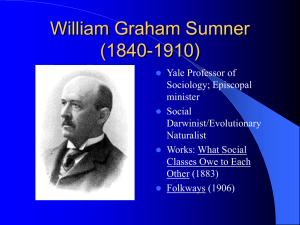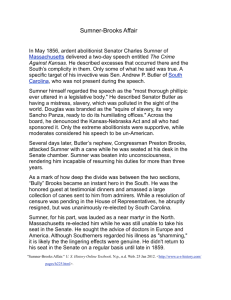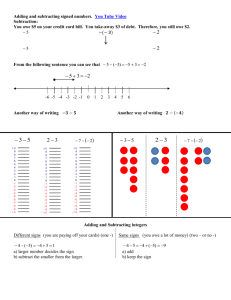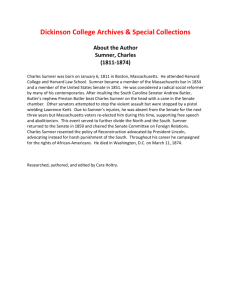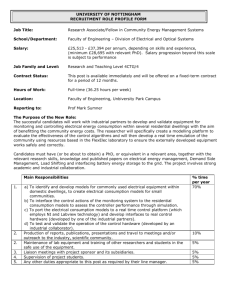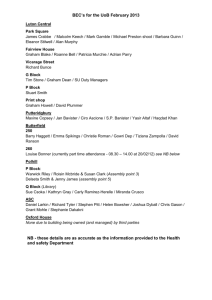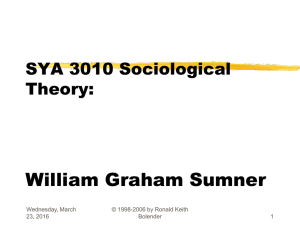William Graham Sumner, What the Social Classes Owe to Each
advertisement
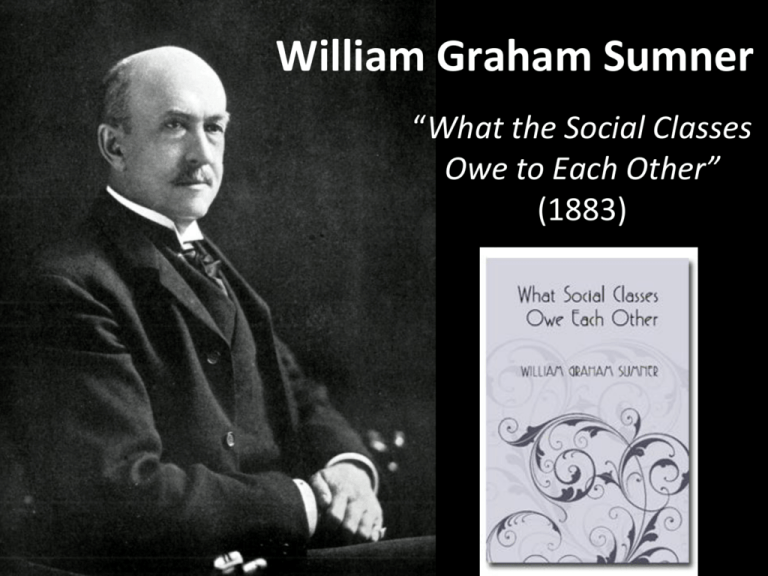
William Graham Sumner “What the Social Classes Owe to Each Other” (1883) • 1840- Born in Paterson, New Jersey • Grew up in Hartford, Connecticut, son of self-educated, working-class immigrant • 1866- Studied theology and philosophy at Oxford • 1869- He left Yale to be rector of churches in NYC and Morristown, NJ • 1872- Became the first professor of political and social science at Yale • 1907- Produced a work that gave him worldwide renown. Originated the concepts of ethnocentrism, folkways & mores • 1910- Sumner died in Englewood, NJ Social Darwinism • Social existence is a competitive struggle among individuals possessing different natural capacities and traits – those with better traits succeed, becoming wealthy and powerful – those lacking in discipline or intelligence sink into poverty • Government must not interfere to improve conditions because this would only result in the preservation of bad traits while penalizing those who possess good traits Sumner & Social Darwinism • Competition for property and social status resulted in a beneficial elimination of the ill adapted • Conditions that needed reform were the proof that society was functioning as it should • Opposed all reform proposals because they would impose excessive economic burdens on the middle class, the "forgotten man" • Feared the development of a welfare state William Graham Sumner, What the Social Classes Owe to Each Other (1883) Main Point 1: The State’s role should be limited to protecting the people. • “When it exercises will or adopts a line of action--it is only a little group of men chosen in a very haphazard way by the majority of us to perform certain services for all of us.” • “The state, instead of offering resources of wisdom, right reason, and pure moral sense beyond what the average of us posses, generally offers much less of all these things.” • “The state is not even the known and accredited servants of the state, but, as has been well said, is only some obscure clerk, hidden in the recesses of a Government bureau…” • “Also whether there is anything but a fallacy and a superstition in the notion that “the State” owes anything to anybody except peace, order, and the guarantee of rights” William Graham Sumner, What the Social Classes Owe to Each Other (1883) Main Point 2: According to God and Nature, everyone in life will have hardships. We cannot blame our fellow man for this, nor can we revise the reality of Nature. “But God and Nature have ordained the chances and conditions of life on earth once and for all. The case cannot be reopened. We cannot get a revision of the laws of human life. We are absolutely shut up to the need and duty, if we would learn how to live happily, of investigation the laws of Nature, and deducing the rules of right living in the world as it is” “Certain ills belong to the hardships of human life. They are natural. They are part of the struggle with Nature for existence. We cannot blame our fellow-men for our share of these.” William Graham Sumner, What the Social Classes Owe to Each Other (1883) Main Point 3: If the government forces one to contribute to the equality of another, liberty is sacrificed. “In essence, for the government to finance many reforms, it will have to rob Peter to pay Paul.” “ We shall find that all the schemes for producing equality and obliterating the organization of society produce a new differentiation based on the worst possible distinction…the right to claim and the duty to give one man’s effort for another man’s satisfaction! We shall find that every effort to realize equality necessitates a sacrifice of liberty.” William Graham Sumner, What the Social Classes Owe to Each Other (1883) Main Point 4: Each person’s main responsibility is to take care of himself; mind his own business. “ Every man and woman in society has one big duty. That is, to take care of his or her own self.” “...there is a danger that a man may leave his own business unattended to; and second, there is a danger if an impertinent interference with another’s affairs” “We won’t have to worry about taking care of the rest of society. By taking care of our own responsibilities, society, as a result, will also be taken care of. William Graham Sumner, What the Social Classes Owe to Each Other (1883) Main Point 5: Contracts are rational. Different parties enter into contracts based on reason. Contracts foster liberty, individualism, and independence, and America is prosperous and free because it is a society bounded by contracts. • “Contract, … is rational- even rationalistic. It is also realistic, cold, and matter-of-fact. A contract relation is based on a sufficient reason, not on custom or prescription. It is not permanent. It endures only so long as the reason for it endures.” • “A society based on contract is a society of free and independent men, who form ties without favor or obligation, and co-operate without cringing or intrigue.” • “A society based on contract, therefore, gives the utmost room and chance for individual development, and for all the self-reliance and dignity of a free man William Graham Sumner, What the Social Classes Owe to Each Other (1883) Main Point 6: The Forgotten Man is the person who works hard, takes care of himself, and suffers quietly. “He passes by and is never noticed, because he has behaved himself, fulfilled his contracts, and asked for nothing……” “He will be found to be worth, industrious, independent, and self-supporting. He is not technically, “poor” or “weak” he minds his own business, and makes no complaints. Consequently the philanthropists never think of him, and trample on him….” William Graham Sumner, What the Social Classes Owe to Each Other (1883) Main Point 7: “The pursuit of happiness” should not be confused with the possession of happiness. “Rights do not pertain to results, but only to chances. They pertain to the conditions of the struggle for existence….It cannot be said that each one has a right to have some property, because if one man had such a right some other man or men would be under a corresponding obligation to provide him with some property.” William Graham Sumner, What the Social Classes Owe to Each Other (1883) • Questions to Consider 1. Is it the duty & burden of one class to struggle to solve the problems of another class? 2. Does one class have the right to put demands on another class? 3. Does the State owe anything more to the people other than peace, order, & the protection of rights? Historical Significance: Sumner’s philosophy became the dominant economic philosophy of the nation until the Great Depression forced Americans to reconsider laissez-faire ideology.
